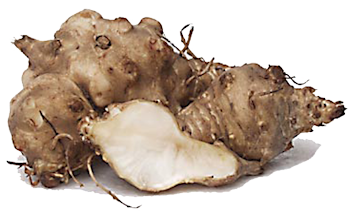|
Jerusalem
artichoke is moderately high in calories; provides about 73 calories per 100 g,
roughly equivalent to that of potatoes. The root has negligible amounts of fat
and contains zero cholesterol. Nevertheless, it's high-quality phyto-nutrition
profile comprises of dietary fibre (non-starch carbohydrates), and antioxidants,
in addition to small proportions of minerals, and vitamins.
It is one of the
finest source dietary fibres, especially high in oligo-fructose inulin, which
is a soluble non-starch polysaccharide. Inulin should not be confused for
insulin, which is a hormone. The root provides 1.6 mg or 4% of fibre. Inulin is
a zero calorie saccharine, and inert carbohydrate, which does not undergo
metabolism inside the human body, and thereby; make this tuber an ideal
sweetener in diabetics and dietetics.
Soluble as well
as insoluble fibres in this tuber add up to the bulk of food by retaining
moisture in the gut. Studies suggest that adequate roughage in the diet helps
reduce constipation problems. Dietary fibres also offer some protection against
colon cancers by eliminating toxic compounds from the gut.
The tuber
contains small amounts of anti-oxidant vitamins such as vitamin C, vitamin A,
vitamin E. These vitamins, together with flavonoid compound like carotenes,
helps scavenge harmful free radicals, and thereby offers protection from
cancers, inflammation and viral cough and cold.
Further,
Jerusalem artichokes are a very good source of minerals and electrolytes,
especially potassium, iron, and copper. 100 g of fresh root holds 429 mg or 9%
of daily-required levels of potassium. Potassium is a heart friendly
electrolyte which brings reduction in the blood pressure and heart rate by
countering pressing effects of sodium.
100 g of fresh sun
choke contains 3.4 mg or 42.5% of iron, probably the highest amount of iron for
the common edible roots and tubers.
It also contains
small levels of some of valuable B-complex group of vitamins such as folates,
pyridoxine, pantothenic acid, riboflavin, and thiamin.
Control cholesterol:
Soluble fibre present in Jerusalem artichoke helps to lower
blood cholesterol level by lowering low density lipoprotein or bad cholesterol
levels. Apart from that fibre is also beneficial for other heart health
benefits like reducing inflammation and blood pressure. Raw Jerusalem artichoke
consists of 2.4 g of fibre which is 6.32% of the daily recommended value.
Control blood
pressure: Jerusalem artichoke consists of considerable
amount of potassium and minimal amount of sodium, which is helpful in lowering
blood pressure. One cup of raw tuber contains 644 mg of potassium and only 6
milligrams of sodium. Similarly, the fibre content in the Jerusalem artichoke
is supportive in improving the performance of insulin in the body, which helps
in the lowering of blood pressure.
Boost the immune
system: Antioxidant vitamins like vitamin A, vitamin C and vitamin E
are available in Jerusalem artichoke in minimal amounts. All these vitamins
along with flavonoid compounds like carotenes helps seek and remove free
radicals, providing the body protection from cancers, viral cough, inflammation
and common cold. One cup of raw tuber consists of 2 µg of vitamin A, 6 mg of
vitamin C and 0.28 mg of vitamin E.
Muscle Function: Iron which is sufficiently found in Jerusalem artichoke is an
essential element for better muscle health. Iron is present in the muscle
tissue and helps to provide the supply of oxygen which is needed for
contraction of muscles. Without sufficient iron muscle will lose its tone and
elasticity which leads to muscle weakness and muscle weakness is one of the
major indication of anaemia.
Supports a Healthy
Cardiovascular System: Jerusalem artichoke consists of
sufficient amount of Thiamine which is essential for producing neurotransmitter
called acetylcholine which is used to relay message between nerves and muscle.
Our heart is one of the main muscles that rely on these crucial signals. So as
to maintain proper cardiac function and healthy heart beat rhythms, the nerves
and muscles must be able to use bodily energy to keep signalling to each other.
Recent research has shown that thiamine is
helpful in combating heart disease since it maintains healthy ventricular
function and to help treat heart failure.
Helps Prevent
Premature Aging: Copper is a powerful antioxidant
which is present in Jerusalem artichoke which works in presence of antioxidant
superoxide dismutase to safeguard the cell membranes from free radicals. It is
one of the powerful antioxidant which helps to fight against free radicals.
Free radicals may attack several organs systems but are particularly studied in
terms of their effects on aging like age spots, wrinkles, macular degeneration
as well as kidney malfunctions. Therefore sufficient amount of Copper is
required for looking younger for longer time. Raw Jerusalem artichoke consists
of 0.21 mg of copper which is 23.33% of the daily recommended value.
Helps Maintain
Dental Health: Jerusalem artichoke consists of
huge amount of phosphorus which is bone and teeth health. Phosphorus along with
calcium and vitamin D plays an important role in formation and maintenance of
dental health by supporting tooth enamel, jaw bone mineral density. Apart from
that these vitamins and minerals also help to heal tooth decay.
Basically children need foods that are high
in phosphorus and calcium while they are developing adult teeth in order to
form teeth’s hard structure. Vitamin D is required along with phosphorus to
control the body’s balance of calcium and improve its absorption during tooth
formation. Vitamin D can also help to decrease inflammation of gums which is
related with periodontal gum disease.
|

